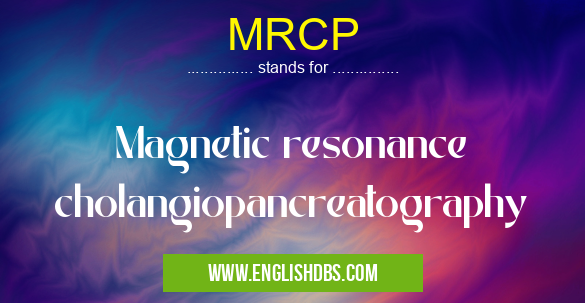What does MRCP mean in CLINICAL MEDICINE
Magnetic resonance cholangiopancreatography (MRCP) is a non-invasive medical imaging technique that uses magnetic resonance imaging (MRI) to visualize the biliary and pancreatic ducts. It provides detailed images of the gallbladder, bile ducts, and pancreatic ducts, allowing healthcare professionals to diagnose and monitor a wide range of conditions affecting these organs.

MRCP meaning in Clinical Medicine in Medical
MRCP mostly used in an acronym Clinical Medicine in Category Medical that means Magnetic resonance cholangiopancreatography
Shorthand: MRCP,
Full Form: Magnetic resonance cholangiopancreatography
For more information of "Magnetic resonance cholangiopancreatography", see the section below.
How MRCP Works
MRCP utilizes a special MRI sequence that suppresses the signal from surrounding tissues, making it possible to clearly visualize the fluid-filled biliary and pancreatic ducts. The procedure typically involves the injection of a contrast agent into a vein to enhance the visibility of the ducts. The patient lies inside the MRI machine for about 30-60 minutes while images are acquired.
Applications of MRCP
MRCP has a wide range of applications in the diagnosis and management of various conditions, including:
- Biliary tract disorders: MRCP helps diagnose and evaluate conditions such as choledocholithiasis (gallstones in the bile ducts), cholangitis (inflammation of the bile ducts), and biliary atresia (congenital absence of bile ducts).
- Pancreatic disorders: MRCP can detect and characterize conditions like pancreatitis (inflammation of the pancreas), pancreatic duct stones, and pancreatic cancer.
- Liver disorders: MRCP provides insights into the structure and function of the liver, helping diagnose conditions such as cirrhosis and liver tumors.
- Evaluation of abdominal pain: MRCP can assist in identifying the cause of unexplained abdominal pain by visualizing the biliary and pancreatic systems.
- Preoperative planning: MRCP offers valuable information for preoperative planning in cases involving biliary or pancreatic surgery.
Advantages of MRCP
- Non-invasive: MRCP does not involve the insertion of instruments into the body, making it a comfortable and safe procedure for patients.
- Detailed visualization: MRCP provides detailed cross-sectional images that allow for the precise assessment of the biliary and pancreatic ducts.
- Radiation-free: Unlike traditional X-ray procedures, MRCP does not use ionizing radiation, reducing the risk of radiation exposure.
- Versatile: MRCP can be used to evaluate both the biliary and pancreatic systems in a single examination.
- Helpful in complex cases: MRCP is particularly useful in cases where other imaging modalities, such as ultrasound or endoscopic retrograde cholangiopancreatography (ERCP), may not provide sufficient information.
Essential Questions and Answers on Magnetic resonance cholangiopancreatography in "MEDICAL»CLINICAL"
What is magnetic resonance cholangiopancreatography (MRCP)?
MRCP is a non-invasive medical imaging technique that uses magnetic resonance imaging (MRI) to visualize the bile ducts and pancreas. It is used to diagnose and evaluate conditions affecting these organs, such as gallstones, pancreatitis, and tumors.
How is MRCP performed?
MRCP is performed using a strong magnetic field and radio waves to create detailed images of the bile ducts and pancreas. The procedure typically takes about 30-60 minutes and is performed on an outpatient basis. You will lie on a table that slides into a large magnet. A contrast agent may be injected into a vein to enhance the visibility of the ducts and pancreas.
What are the benefits of MRCP?
MRCP is a non-invasive procedure that provides detailed images of the bile ducts and pancreas. It is a safe and painless procedure with no radiation exposure. MRCP is also more accurate than other imaging techniques, such as ultrasound or CT scans, for diagnosing certain conditions.
What are the risks of MRCP?
MRCP is a generally safe procedure, but there are some risks associated with it. These risks include:
- Allergic reaction to the contrast agent
- Kidney damage (if you have kidney problems)
- Claustrophobia (fear of enclosed spaces)
Who should get an MRCP?
Your doctor may recommend an MRCP if you have symptoms that suggest a problem with your bile ducts or pancreas, such as:
- Abdominal pain
- Jaundice (yellowing of the skin or eyes)
- Dark urine
- Light-colored stools
- Fever
- Nausea and vomiting
Final Words: MRCP is a valuable medical imaging technique that provides detailed visualization of the biliary and pancreatic ducts, enabling healthcare professionals to diagnose and manage a wide range of conditions affecting these organs. Its non-invasive nature, detailed imaging capabilities, and versatility make it a preferred imaging modality for various clinical applications.
